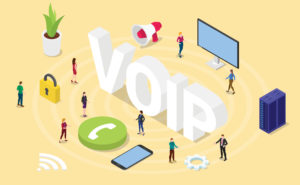Pros and Cons of Latest VoIP Solutions

VoIP enables phone calls over the Internet, which grants quite a few advantages over a traditional landline. VoIP offers low calling rates across the board, but particularly when talking about overseas calls. VoIP also usually has better voice quality than traditional phones, and extra features can easily be added or subtracted at will instead of waiting on bulky hardware.
While it’s possible to use a traditional phone with an adapter, VoIP phones connect directly to a computer designated as the VoIP gateway. The computer functions as a bridge between the phone and other telephone users, enabling the phone’s access to the global network.
VoIP Types Breakdown
Cloud vs. Local
Really, this one comes down to where the VoIP gateway computer is physically located. Bigger businesses often have the gateway computer there physically on site. However, a VoIP gateway computer is both expensive and complicated, so a cloud hosted service is frequently more feasible for small to medium businesses. For instance, we here at NoContractVoIP provide cloud hosted service to our clients. We own and maintain the VoIP gateway computers for our clients, freeing them from paying dedicated IT people to service and update custom expensive hardware.
Which System?
Classical VoIP is based on Internet standards like SIP and RTP. The best-known example of a commercial service like this is Vonage.
Some newer systems are based on a different standard, called Asterisk. This is a sturdy system supported by multiple vendors. We chose to go with Netsapien for a number of reasons, but that doesn’t make any one standard good or bad, they each have strengths and weaknesses.
(If your eyes are glazing over, don’t worry about all this. It only matters if you’re trying to figure out compatible addons on your own.)
We just cannot discuss VoIP software without talking about Skype, the best known free peer-to-peer service that served as most people’s introduction to Internet telephones. Skype famously offers a free, consumer-focused, peer-to-peer service. Plenty aren’t aware that they also offer services aimed at businesses of all sizes. No longer constrained to a program on a computer, these days one can find dedicated desk phones for use with Skype.
Security
Extra security presents one of the largest advantages of VoIP over regular phone service. With traditional copper lines, anyone with a telephone set and access to the wire could listen in on phone calls. VoIP calls are by their nature more secure than that, and then we bring easy encryption into it.
To understand it, think of working with a secure website like a bank. It’s easy for a business owner to enable encryption and authentication on the same level for their business communication.
Of course, anybody using the Internet in a business capacity for anything, including VoIP, needs to ensure they use business-class security.
Any competent VoIP service provider should also have answers about how emergency calling will work, either 911 or 112 depending on location of the office. Some providers are better than others about routing calls to the correct dispatcher for the office’s physical location.
Types of Equipment
What precisely do you want on your desk? With VoIP, you get three main choices:
- A regular, wired phone that you’re used to: You can connect any traditional phone to a VoIP system with an analog terminal adapter (ATA). The simplest type of ATA has two sockets: one for the phone and one to plug into your computer network. We at NoContractVoIP offer those as part of our services
- A dedicated digital VoIP phone: These all-in-one phones connect directly with your network. They’re meant to specifically be VoIP phones, so they often feature extra buttons to access special features — for instance, you’ll probably find a “call back” button instead of using arcane number pad commands like *69.
- A softphone: It’s an app, y’all. It goes on your computer, tablet, or smartphone, and lets you make phone calls from there. Skype is usually the most familiar program, but other VoIP systems can also work with pure app phones. Others that people are familiar with are AOL Instant Messenger, Cisco IP Communicator, and Jitsi.
Potential Pitfalls to Consider
Traditional phones continue to work during a power outage because they’re on their own low voltage power supply from the phone company. They’re usually not hooked up to your building’s power. However, VoIP runs through your Internet service, which means it’s dependent on your modem and router. Without battery system backup, you’ll probably lose service if the power shuts off. Think about keeping a cellphone as a backup. We can easily reroute your business system to your cellphone in the event of an outage.
You might not be able to keep your current phone number, and that depends on multiple factors. Ask your intended provider about number portability before committing.
VoIP doesn’t always work well for uses other than voice calls, such as elevators, alarm systems, or credit card processing. Again, ask your provider about those needs.
Ready For A Top Notch VoIP Business System?
Here at NoContractVoIP, we create custom business phone systems that offer a full suite of office, hybrid and remote solutions for your telecom needs. Your success is our success.
To get the latest helpful content delivered to your inbox every month, subscribe to our newsletter here.
Looking for the finest stress-free custom business telephone systems? Contact us or call today at 866-550-0005!
-Image Credit
